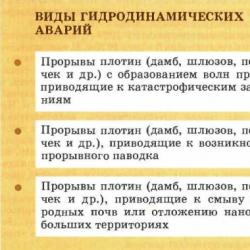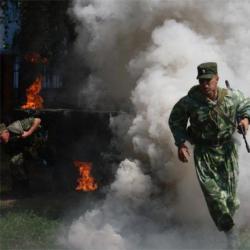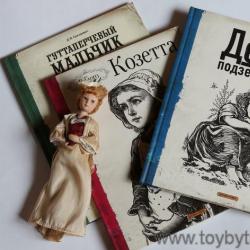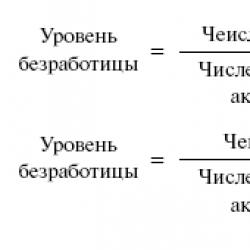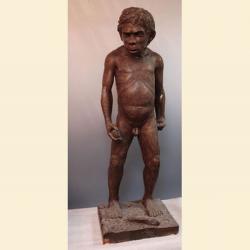Who is a Cossack ataman and how does he differ from an ordinary person? The meaning of the word ataman From north to south
Who is an ataman and what is the meaning of the word “ataman” you will learn from this article.
Who is the ataman?
Ataman is official elected official in the Zaporozhye Sich during the 16th - 18th centuries. The ataman headed the entire Sich organization or a separate Military-administrative unit - the hut. If it happened that the ataman was not elected for certain reasons, but was appointed, for example, during a military campaign, then he was called a mandated ataman. In the Hetmanate during the 17th - 18th centuries, there were also positions of city, village and hundred atamans.
What does the word "ataman" mean?
The concept of ataman means “father of people” from the Turkic language. Nomads previously called this the oldest representatives of their clan. There is also another version, according to which the word ataman comes from the German word “Harter Mann”, which means “strong man”. Since the 16th century, atamans began to be called the elected or appointed leader of the Cossack army.
Ataman is elected person heading the hut. He was in charge of the management and facilities of the kuren, and resolved absolutely all issues relating to the life and everyday life of the Cossacks.
The word “ataman” has existed in our vocabulary for many centuries, it has even become a geographical name-toponym (Atamano-Vlasovka, Atamanovka, etc.); With the revival of the Cossacks, the word is increasingly entering everyday speech, and it is all the more surprising that the origin of the word “ataman” still remains an unanswered question. In the most complete and serious study of the history of the Cossacks, in the 4-volume “History of the Cossacks” (Gordeev A.A.M., 1993), the “Mongolian” version of the origin of the word “ataman” is set out as the final one, with reference to Goryaev’s “Etymological Dictionary” N. (Tiflis, 1896): “The highest command positions in the Cossack troops were occupied by the Mongols and the main military figure was temnik. Modern researchers derive the word “ataman” from the combination of two Mongolian words: ata- “father or father” and dark, or temnik. From the combinations of these words came the name attamen, meaning “temnik father.” Among the armed forces of “Horde Rus'”, along with the national names of military leaders, the name of the highest commander was gradually adopted ata-temena, which in a slightly modified form became “ataman”. The name “hetman” had the same origin, with some change in pronunciation due to the local dialect.” M. Vasmer in his dictionary cites the opinion of A. Preobrazhensky (1910-1918): “The explanation of the ataman from the Turkic is completely unacceptable. Ata"father" and Tumen"10000" According to a number of other etymologists of the word vataman, ataman, like Polish hetman ascend to him. Hauptmann. This interpretation, as M. Vasmer notes, is fraught with phonetic difficulties, therefore Brückner et al. separate (in) ataman “elder” from the group “ hetman». These are practically all existing opinions about the origin of the word “ataman”. Therefore, first we will analyze the above considerations, and then we will continue the semantic analysis of the word. (IN) ataman, as everyone notes, is a dialectal version of the word ataman; “v” is a prosthetic consonant, as, for example, in the word “vostry” (sharp), so this version of the word does not interest us. The most surprising thing about the “Mongolian version” is that it is absolutely unconfirmed. The fact is that in the Mongolian language “father” is etseg, etseg, "horse" - sea, maren(Oirat.), agt(Kalm.), the last word is easily explained by Turkic influence. Word Tumen in the meaning of “many, darkness, cloud, 10,000” was borrowed by the Russian, Turkic, and Mongolian languages from Iranian, where the word fog has very specific meanings - 1,0000 dinars and a division (modern). The Turkic military rank is “temnik”, in Persian it will be myrrhfog, a very high military rank, in rank it is significantly higher than the rank of “ataman”; Timur, at the head of 1,0000 horsemen, appointed not only worthy, but also noble people - emirs and murzas. Ataman could not apply for a general’s position, in modern terms, and therefore attumen- He could not become the “father of Tumen”. But, strictly speaking, this is not the point at all. Ataman And hetman- words of different origin, although there is some semantic similarity between them. Phonetically, they are united only by the formant “man,” which is widespread throughout the entire Ecumene and is included in the most unexpected and diverse words. For example, lake Man (Manych from the 16th century), lake. Liman (Lake Geneva), o. Man in the Irish Sea (last refuge of the Celts). Word formation with the form “man,” according to authoritative experts, ceased in historical times, and the question of the origin of the affix still remains open. But we are interested in this formant in one meaning, in this case, in the meaning of the doer: dushman(Turkic) - “enemy, enemy”; Turkmen; mankurt(“man-death”, Chingiz Aitmatov); mardoman- “people, people”, etc. Let’s remember what’s in it. and in English this word means “man, man.” « Hetman, the word is borrowed through Polish from the East. Wed German “Hauptmann” (modern captain) (M. Vasmer). The word belongs to the semantic series - “chief, leader” - Hauptmann(German), headman(English) sarkor(Irish); Kurbashi(Turkic), where, accordingly, head- “haupt, hed, sar, bash.” The word “ataman” refers to another semantic series, namely “horsemen”. The word “horseman” can be formed in different ways, namely, according to the principle of “centaur” - “horse-man”, as for example in the English “hos-man” or in the Hungarian “lo-vas” or other ind. "as-man"; or with the help of affixes, as, for example, in Russian or Spanish - “ko-n-nik”, “kobal-ero”, or in Turkic. “at-chi, at-ly, at-lik”... And, of course, words of ancient origin, the etymology of which is difficult, such as, savr, savar, suvori, amazon-ka, horseman, chavandoz etc. Let's continue the analysis. At(Turkic) - “horse”, therefore atman- “rider”; the word, naturally, is rarely used, but we find evidence of its existence in toponymy - in the Kherson region there is the village of Atmanai (village of Vsadnikov), known to historical literature only due to the fact that the famous burial in the “High Grave” mound was discovered nearby. North of Tambov there is the village of Atmanov Ugol and it is unknown how many Atmanovkas have become more understandable Atamanovkas over time. Undoubtedly, the original form of the word “ataman” was the word “atman”, and it is possible that with the advent of the concept “ataman” the word “atman” began to fall out of use; fortunately, there was no shortage of synonyms. Let us pay attention to the proximity of such words in Turkic languages as: ata- "father", attack- “father” (affectionate) and atchi, atman- “rider”; and in Russian: ko-gan, ko-n-yaz, ko-n-nik, ko-mon(“...the Komoni laugh at Sula...”), where co- possibly the oldest form for "horse", as in Magyar lo- “horse, horse.” It is enough to look into the dictionaries of Germanic languages to understand the basic ko-nigov And Ko-Nungs was borrowed from Slavic languages, and not vice versa, as is commonly believed. Just as the word "prince" ultimately came from "horse", so "ataman" probably has a similar origin. For a person with a native Turkic language, the word “ataman” sounds either funny - at-aman(yaman) - “bad horse”, or unclear - ata-man _ "father man." Perhaps the word appeared as an intermediate Turkic ataatman- “leader of the horsemen, father of the horsemen”, and subsequently very quickly turned into contamination in ataman. In other words ataman- this is “prince”, but of lesser rank. If the word “hetman” allows for literal translation, then the word “ataman” no longer does. A literal translation is not possible because the word was born in a bilingual Russian-Turkic environment. The word is Turkic in form, but in Turkic languages it is known as “Russianism”. In “The Tale of Timur-Aksak” XIV-XV centuries. the chronicler wrote: “And when their number reached a hundred, they called him their ataman, when their number reached a thousand, then it was already prince his name was." Therefore, knowing the scale of the war that Stepan Timofeevich Razin waged with Tsar Alexei Mikhailovich, we should not be surprised by Razin’s demand to call him publicly and in writing nothing other than “prince, Stepan Razin, ataman.” (
The phrase “Be patient, Cossack, you will become an ataman!” has long been winged. When pronouncing it, we don’t really think about the meaning of the words, although we put the correct meaning into it. Many people associate the leader of the free Cossacks with military honor, valor and courage, but is everything so simple with this title? Is Ataman a noble commander or a dashing robber? Let's look into this issue.
Who are the atamans?
This term has several definitions, each of which quite justifiably conveys the essence of the type of affairs that a person called an ataman has to deal with. First of all, he is the leader of the Cossacks, replacing their father not only in everyday “household” affairs, but also during military exploits. Moreover, ataman is an elected, practically democratic position; dashing warriors independently and at their own discretion choose their leader, and if they are dissatisfied with their own decision after a certain time, they can deprive him of the right to be their representative.
But there is another meaning regarding what “ataman” is. The definition given in explanatory dictionaries says that this person is the head of bandits, mercenaries and robbers. In this vein, the word takes on a rather negative connotation, and the ataman himself is not associated with either a brave or courageous person. The bandit leader in the subconscious of the majority is not a fair Robin Hood, but, on the contrary, an unprincipled Nightingale the Robber, who does not hesitate to use any means to achieve his goals and methods, and is ready to transgress all concepts of honor and nobility.

Robber Soul
In fact, this is how it is, the ataman is the leader of a group of people who have escaped from the generally accepted legal system. At one time, when the very concept of the Cossacks was just emerging, as well as during the heyday of this page in the history of our state, people from this social class were not a military unit subordinate to the commander-in-chief (tsar or governor). They belonged to themselves, obeyed only their elders, who was guided in their actions by the principle “whoever pays the most, we serve.”
The Cossacks were more bandits, gathered into disparate groups that did not cooperate with each other for a long time; on the contrary, they divided spheres of influence. Ataman (the definition sounds like the leader of a bandit group or irregular military formation) gathered his subordinates as needed. He was responsible for providing the gang with food and weapons, was involved in tactical planning and was generally its “brains”.

Military rank
The ataman of a Cossack detachment is the leader of a military unit. Its number could be different, so atamans were divided not only into the well-known kuren and koshev (we will talk about these ranks in a little more detail), but also into marching, detachment, and punishment. There were also divisions into leaders responsible for specific areas of activity, for example, the Lisitsky ataman was the person who was in charge of hunting, the guard was responsible for trade, and the school chieftain taught the Cossacks the basics of science and literacy.
A very capacious meaning of the word “ataman” is acquired along with the prefixes “zimovy”, “stanitsa”, “village”. Such leaders were responsible for the administrative-territorial unit entrusted to them, as well as its inhabitants. In addition to direct recruiting, such atamans dealt with issues of resolving conflict situations and collecting money, including from retail outlets located in the territory entrusted to them.
This man possessed not only judicial power and could judge quarreling Cossacks, but also executive power, so he could physically punish his subordinate, who, rather, could be called a ward, because the soldiers could, at their discretion, both choose their leader and “dismiss” him . In a combat situation, subordination to the ataman was unquestioning; the Cossacks followed their “father” and were ready to lay down their heads on the battlefield for him.

From north to south
Who the ataman was was known in many territories. This position is most often noted among the Don and Zaporozhye Cossacks. But they were not the first to call their leader that way. The first mentions of chieftains are in historical documents of the thirteenth century; the later officially approved “chieftain” was Karsten Rohde, which is surprising, because he was a sailor. Tsar Ivan the Terrible in 1570 issued him a license for privateering in the waters of the Baltic Sea, which clearly stated that Karsten was given the title of ataman of the ship and its crew.
However, this term is still more applicable specifically to land military leaders who were related to the Cossacks. Atamans were in the following power structures:
- Zaporizhian Cossack army.
- Black Sea Cossack Army.
- Don Cossack Army.
- Novgorod chiefs of the city guard.
Let us note that in the Ukrainian language this title is written and sounds a little differently, namely, as “otaman,” which is incorrect from an etymological point of view, because then the word loses the roots of its origin.

Origin of the word
What “ataman” is will help to clarify the analysis of the word and the translation of its individual parts from the source language. The most common version of the origin is considered to be a transfiguration from the Germanic dialect of the words atta and mann. The first can be interpreted as “father”, and the second as “husband”, “knight”. Combined together, both parts give rise to the term “ataman,” which very well explains the essence of this military rank, because it is translated as “father of warriors.”
There is another opinion, according to which the ancestor of this word is one of the names of the Ottoman Empire, which was also called Ottoman. The Zaporozhye Cossacks did not always defend the borders of their state. Their first formations did not hesitate to sell their services to the Crimean khans; some were minions of the ruler of the Golden Horde. Perhaps this was the reason to believe that the word “ataman” is of Eastern origin.
Our answer to the Amazons
Usually the wife of the leader of the Cossacks or robbers was called an atamansha; however, there were those ladies in history who rightfully bore this title, being real warriors. One of the most desperate was Maria Nikiforova, better known as Marusya.
The girl was the daughter of a military man, perhaps this left a strong imprint on her life views and values. Being very young, she joined the anarchists, at first participated in propaganda activities, then gathered around her a whole team of like-minded people.
Even before she came of age (21 years old), she was engaged in terrorist activities, was involved in robberies, murders and robberies, for which the official authorities sentenced her to death, which, however, was not put into effect, replacing it with an indefinite exile to hard labor.
She managed to escape from there and resume her dark business. Marusya's detachment operated in different territories and was always in the thick of the events of the Civil War. The girl was partly subordinate to the Makhnovists, and also assisted the Bolsheviks, but in the end she was never able to engage in any constructive activity. According to one version, Marusya was shot when a massive purge of unreliable and dangerous elements began in the new, communist society.

Cossack father
As we have already said, atamans are divided into kurenny and koshev. The former were less significant in terms of their sphere of influence, but this statement is quite controversial. There were 38 people with this rank in the Sich, each of them had a kuren under his command. The ataman, who was also called kuren, was chosen by the Cossacks themselves; he was either a former governor or an ordinary employee. The main thing is that his person satisfies the majority of community members. No one else could influence the election process; it would always be exclusively “their own” person, who was revered, respected and listened to.
The chieftain received a salary. At that time, when the Cossack army was subordinate to the imperial power, it amounted to 27 rubles, and the soldiers (voluntarily and at their own discretion) shared part of the booty with it. The attitude towards the kuren was so trusting and “filial” that the Cossacks could go for his sake even against the will of the highest-ranking governor and, on the contrary, at the request of their immediate leader they endured temporary difficulties and hardships.
Koshevoy Ataman
A man with such a title was the head of the camp; he had under his command not only the Cossacks themselves, but also the kurens, the clerk, the captain, and the judge. Like the kuren ataman, the koshev was also elected to the Rada, where he had to annually give a report on his activities. Possessing almost unlimited powers, he had to constantly confirm his own right to them.
ATAMAN
dial Vataman, Ukrainian ataman, otaman. Old Russian vataman (often from 1294). Srezn. (I, 231 et seq.) leads to ataman, but cannot give equally old examples of the latter. Wed. also Polish wataman in Paprocki (1584), according to Brückner, KZ 48, 172 et seq. At the same time, in the 17th century. often ataman: "The Death of Skopin-Shuisky", "Azovsk. View." etc., see RFV 56, 139. According to the old opinion (Mi. EW 5; Bernecker 1, 378; Preobr. 1, 9 et seq.; Brandt, RFV 22, 124), these words, like Polish. hetman, go back to him. Hauptmann, formerly Heubtmann. This interpretation is fraught with phonetic difficulties, therefore Brückner (KZ 48, 172), Dashkevich (AfslPh 4, 545) and Smal-Stotsky ("Slavia" 5, 44) separate (in) ataman "elder" from the hetman group (see below hetman). Brückner (ibid.) makes an attempt to trace the first word to Türkic. odaman "elder of the shepherds or Cossack camp", Tur., Crimea-Tat. oda "soldier's artel", "detachment" (Radlov 1, 1121) and refers to the prosthetic v- in the gang. Wed. Yagich's doubts (AfslPh 4, 545). The explanation of Goryaev, ES 438: ataman from the Turkic people is completely unacceptable. ata "father" and tuman "10000"; against see Convert. 1.9.
(Cf. also Dmitriev, Lexicogr. collection, Z, 1958, p. 17. - T.)
Etymological dictionary of the Russian language. Vasmer Max
Meaning
T.F. Efremova New dictionary of the Russian language. Explanatory and word-formative
ataman
and there A n
m.a) The highest commander of the Cossack army.
b) The head of the Cossack administrative-territorial unit - district, village, etc., performing military, police and administrative functions.
2) decomposition The leader of a bandit or thieves' gang.
Modern explanatory dictionary ed. "Great Soviet Encyclopedia"
ATAMAN
1) the leader of an armed detachment...2) The highest commander of the Cossack army (military, command, marching, Koshevoy ataman), the head of a Cossack administrative-territorial unit (district, department, stanitsa, farm ataman) or unit commander (kuren ataman).
S.I. Ozhegov, N.Yu. Shvedova Explanatory dictionary of the Russian language
ataman
ATAMAN, -a, m.
1. The highest commander in the Cossack troops, as well as the military-administrative chief in the Cossack regions. Stanichny A. Voyskovoy A. A. Cossack circle.
2. trans. Leader, leader. A. robbers.
| and. ~sha, -and (to 2 digits; decomposed).
| adj. ~sky, oh, oh.
Small Academic Dictionary of the Russian Language
